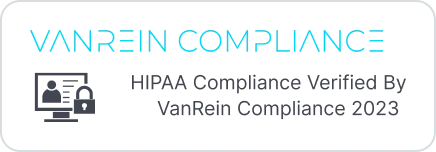Remote Receptionists in Healthcare: Where’s the Catch?
In 2023, 54% of business executives expressed confidence in their remote workers’ productivity, reflecting how deeply remote work has become embedded in many industries. In healthcare, however, skepticism lingers. While fields like IT and marketing thrive in remote setups, healthcare providers often hesitate, citing patient care's personal, hands-on nature. In healthcare, only 12.24% of workers work remotely.
But remote medical receptionists are quietly redefining the landscape. By efficiently managing patient inquiries, scheduling appointments, and handling administrative duties, they allow in-office staff to focus on what matters most: patient care. Concerns about communication gaps, patient experience, and data security are common. Join our experienced remote receptionist, Sandra Rodriguez, as she demonstrates how to turn these challenges into strengths.

If you have any doubts about remote medical receptionists, let Sandra confidently tackle each of your concerns.
Tearing Down Communication Barriers
First, let’s address the elephant in the room: Can someone working from home truly forge meaningful connections with patients, just like the in-office team? Many providers worry that remote receptionists may create barriers instead of bridges.
Sandra sees it differently. Equipped with tools like Teams for real-time messaging and Epic for comprehensive patient records, she and other remote receptionists maintain a seamless flow of information between patients and clinics. She also defines empathy and attentiveness as core elements of her work.
“I answer 60 to 100 calls daily, making sure each patient feels heard and understood.”
Aside from handling direct patient inquiries, remote receptionists like her manage EHR records and coordinate schedules with doctors and in-house office staff. But despite her extensive workload, Sandra focuses on one patient at a time, paying attention to individual problems and needs. The key is to use the right tools and a compassionate approach.
“A calm and confident voice can turn a frantic patient’s call into a reassuring experience."
This level of dedication often surpasses the expectations placed on traditional in-office setups, proving that distance doesn’t have to mean detachment.
Personal Care Beyond Proximity
Healthcare is deeply personal, and some worry that removing the physical presence of a receptionist compromises the patient experience. It’s a fair concern—patients expect empathy and understanding, particularly in moments of vulnerability.
This is exactly what human remote agents provide, as opposed to AI bots.
“A patient called me, overwhelmed and crying about a possible cancer diagnosis. “Even though I couldn’t give her an immediate solution, I listened, reassured her, and worked on finding an earlier appointment. By the end of the call, she felt supported.”
Another thing worth pointing out is that remote receptionists are dedicated entirely to patient interactions unlike in-office teams who juggle multiple tasks. This undivided focus allows them to prioritize empathy and attentiveness, fostering trust and satisfaction.
And this directly impacts how your patients see you: a recent report showed that 43% of us value politeness and empathy in service—qualities our remote medical receptionists bring to your practice.
Secure Medical Data
Handling sensitive patient data remotely is possibly another sticking point. Without the physical oversight of an office, many providers worry about breaches or mishandling of information. This concern is common, as 73% of IT executives view remote work as riskier than on-site setups. But is it valid if the same security measures and tools are used in both cases?
Sandra explains how security is at the forefront of her role.
“We adhere strictly to HIPAA guidelines, from locking computers when stepping away to verifying personal information securely. Every action we take is monitored, so there’s no room for error or breaches."
We prioritize compliance, equipping receptionists with secure software and ongoing HIPAA and cybersecurity training. These measures are backed by our partnership with VanRein Compliance, a security consultancy that ensures full compliance with industry standards.
Building Trust over the Phone
Trust can feel harder to build when there’s no face-to-face interaction. Patients might wonder: who’s on the other end of the line, and do they care?
The key component of trust is likability. Along with demonstrating expertise, our remote receptionists make a point to show their human side, forming genuine connections with every patient.
“We’re advocates for our clients, sharing details about the doctors and services to make patients feel welcome. Patients may not see us but feel our commitment to their needs.”
That commitment goes beyond just answering questions. By assigning receptionists to specific facilities, we ensure they’re an extension of your in-house team. Staying with one clinic long-term allows them to understand its unique workflows and patient dynamics. It’s this consistency and the personal touch that patients notice and appreciate.
Redefining the Role of Remote Receptionists
Every innovation brings challenges, but remote medical receptionists have proven they can handle them effectively. Sandra and other dedicated receptionists on our team show that distance doesn’t dilute the personal touch but enhances it. By freeing up in-office staff to focus on delivering quality care, remote receptionists allow practices to operate more smoothly and efficiently.
With 4 million patient calls handled annually and 30 years in the industry, we know how to embed a patient-centric approach to your front office.
You’re still not 100% sure? Download our eBook to hear directly from Sandra about a day in her life as a remote medical receptionist and see how this model seamlessly fits your practice.
Remote medical receptionists revolutionize practice efficiency, leveraging EHR Patient Scheduling Services, Medical Insurance Verification Services, and Patient Portal Support to streamline operations. They reduce administrative burdens, ensure accurate scheduling, and elevate patient satisfaction.
If we have convinced you already and you’d like to try it, book your free consultation today!
Epic-Integrated Scheduling: Your Secret to Happier Patients and Smoother Operations
HIPAA-Compliant Scheduling: Your Key to Trust, Efficiency, and Profit
-Mar-02-2024-10-02-28-4279-AM.webp?length=1920&name=image%20(2)-Mar-02-2024-10-02-28-4279-AM.webp)
Subscribe to Our Newsletter
Join Patient Connect newsletter to get fresh updates on time.
-Mar-02-2024-10-02-28-4812-AM.webp?length=1920&name=image%20(1)-Mar-02-2024-10-02-28-4812-AM.webp)


